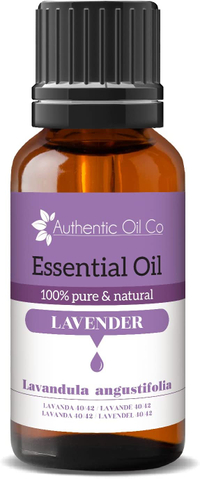I can't sleep! 15 easy ways to fall asleep fast
We've asked the experts how you can get a better night's sleep
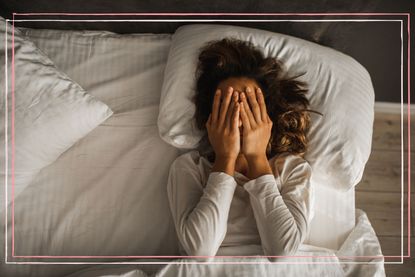

We all know the feeling of tossing and turning in bed thinking 'I can't sleep!' Which is why we've spoken to the experts to find out how to fall asleep fast.
If you often can't sleep and find yourself wondering how you'll wake yourself up in the morning when you're dealing with a lack of sleep, you're not the only one. Many of us struggle with sleep problems, leaving us feeling tired all the time, which can increase the risk of possible health problems, lower our mood, make us forgetful and wreck our motivation.
That's why we've put together this round up of expert tips to help you achieve a better night's sleep, including suggestions to help you drop back off if you've woken in the night. So, forget counting sheep because these simple lifestyle changes could help make your sleep problems a thing of the past.
I can't sleep: 15 tips to fall asleep fast
1. Listen to music
A number of scientific studies suggest that listening to music at bedtime helps those with trouble sleeping. One 2005 study found that music resulted in significantly better sleep quality in adults who listened to 45 minutes of 'sedative music tapes' before going to sleep.
In another 2010 study of women with symptoms of insomnia, it was found that listening to a self-selected album when getting into bed decreased the amount of time it took to fall asleep.
You could try finding a playlist on Spotify - such as this 'Good Night Mix' - or even check out a podcasts to help you wind down before bed. The Nothing Much Happens podcast is a great option for helping you drift off - yoga and meditation teacher Kathryn Nicolai reads bedtime stories where (believe it or not) nothing much happens, to help you relax and sleep peacefully.
2. Don't dwell on it
Dominique Antiglio is a Sophrologist at BeSophro clinics and author of The Life-Changing Power of Sophrology. She says, “If you do find yourself wide awake and struggling to fall asleep, the first thing to do is not to dwell on it, as it could encourage a vicious cycle.
GoodtoKnow Newsletter
Parenting advice, hot topics, best buys and family finance tips delivered straight to your inbox.
“Instead, take the focus away from trying to sleep and place it on something else, something rhythmic like your breath. Combine it with a body scan to allow you to focus on other aspects of the body so that again, you’re not focused on sleep.”
She suggests using this Sophrology technique:
- Focus on your body sensations and feel the movement of the breath. Are there any sensations of tightness in your body, worry in your mind or agitation as a whole?
- Inhale, clenching all the muscles in your body as you hold your breath, then do a long exhale to release all those tensions. Repeat 5 times and then pause, inviting your body into a relaxing body scan.
- Then concentrate on a positive, safe or relaxing image of your choice to prime your mind and body to feel comfortable and safe – key factors in helping you to fall asleep naturally. Repeat as many times as you need until your mind and body are so calm that you naturally fall asleep.
3. Try some relaxation techniques
If you have trouble switching off once you've woken up, try some easy breathing techniques to help you calm back down again. The 4-7-8 method, pioneered by US sleep expert Dr Andrew Weil, is said to work for many in just 60 seconds:
- Exhale completely through your mouth
- Inhale through your nose and count to 4
- Hold your breath and count to 7
- Exhale through your mouth and count to 8
- Repeat the cycle 3 times
4. Put your phone away
One of the worst things you can do when you can't sleep is to start looking at your smartphone - particularly social media sites. If you're struggling to sleep, chances are your mind is already racing, and stimulating it further with a quick scroll is not a good idea.
In addition, the blue light emitted by phone screens restrains the production of melatonin - the hormone that controls your sleep-wake cycle - making it even more difficult to fall asleep. One 2020 study found that using a mobile after the lights are off and keeping the mobile near the pillow are linked to poor sleep quality - so you might want to consider keeping your phone further away from your bed while you're trying to sleep too.
If you're struggling to sleep and want something to distract you, you're better off reading a book, doing a crossword or any other activity you find relaxing.
A post shared by The Fabulous App (@thefabstory)
A photo posted by on
5. Turn off the electric blanket
Believe it or not, research has found that you're more likely to have a better night's sleep when you're a bit chilly than when you're too hot. A 2012 study from Tohoku Fukushi University found that "heat exposure increases wakefulness and decreases slow wave sleep and rapid eye movement sleep."
The researchers add that "on the other hand, cold exposure does not affect sleep stages, though the use of beddings and clothing during sleep is critical in supporting thermoregulation and sleep in cold exposure."
So, if you can't sleep you're best off layering up with a couple of regular blankets than turning up the heat too much. The same goes for having the central heating on too high - opt for a hot water bottle instead.
6. Make a list
Sometimes the best ideas come to us in the middle of the night, but rather than fretting that if you drop back off to sleep you might forget them again, try writing them down. If you can't sleep because you're wide awake and keep running over things that you "mustn't forget" the following day, jot them down instead.
One 2017 study tested this tip, and found that participants who wrote a to-do list before going to sleep fell asleep significantly faster than those who wrote about tasks they had already completed.
We suggest keeping a notepad and pen by your bed and emptying your brain onto it if you wake up with your mind racing. Imagine your thoughts flowing out on to the paper, leaving your mind clear to drift back off to sleep.
7. Hide the clock
If you have a clock within easy glance or reach of your bed, cover it up with something. When you can't sleep, there's nothing worse than watching time tick away, thinking Even if I fall asleep right now, it's only four... three... two... hours before I have to get up.
Take the pressure off yourself and if you do wake up, resist the temptation to check the time and try one of the techniques mentioned above instead.
Physiologist and sleep expert Dr. Nerina Ramlakhan says: "One of the worst things you can do is to keep checking the time. Clock watching will only aggitate you as you'll feel annoyed that you're not falling asleep. And you shouldn't calculate how long you've got left in bed either, as this will only work you up more."
8. Try a natural remedy
There are lots of herbal sleep remedies that can aid an uninterrupted night's sleep. Magnesium, for example, has been found to have a relaxing effect and one 2021 study suggested that taking a magnesium supplement could help reduce the amount of time it takes to fall asleep compared to a placebo.
Another study published in 2019 found that combination of magnesium, melatonin, and vitamin B was effective in treating insomnia regardless of the cause.
Magnesium Citrate 400mg 90 Tablets - <a href="https://www.prf.hn/click/camref:1011licg5/pubref:hawk-custom-tracking/destination:https%3A%2F%2Fwww.hollandandbarrett.com%2Fshop%2Fproduct%2Fholland-barrett-magnesium-citrate-400mg-tablets-60046952%3Fskuid%3D046952%26utm_campaign%3Dshopping%26utm_medium%3Dcpc%26utm_source%3Dgoogle%26gclid%3DCjwKCAiAk--dBhABEiwAchIwkaiMWTU-ds4i1GwjgflHfNCYuD8gXXr5oR7hMwGJ2mrqO7hvvpS0nxoCYjUQAvD_BwE%26gclsrc%3Daw.ds" data-link-merchant="hollandandbarrett.com"" target="_blank" rel="nofollow">£14.99 | Holland & Barrett
This high strength formula supports healthy bones and muscle function as well as helping to reduce feelings of tiredness and fatigue. It also benefits from superior bioavailability, thanks to the magnesium citrate blend. This means that it is easily absorbed by the body and can get to work straight away.
Most are recommended to take before bedtime, but if you're lying staring at the ceiling at 3am, the mere action of taking something that promises to help you sleep might be enough to help you drift off - sure, it might be a bit of a placebo effect, but if it does the job...
Things to do during the day to help you fall asleep
9. Lay off the booze
Many studies have suggested that drinking alcohol before bed can lead to a disrupted sleep. For example, one 2015 study found that participants with higher levels of alcohol consumption suffered from poorer sleep quality and sleep duration.
So, try giving that evening glass of wine a miss, avoid caffeine after 4pm and see if you sleep any better. You might want to try one of the best non-alcoholic wines instead.
10. Go to the toilet before bed
If you think you may suffer from nocturia (needing to wee in the night), or occasionally find you're going to the toilet during the night, try to avoid drinking lots of fluids before bedtime, and always have a wee before you snuggle down. If you find you get thirsty, keep a glass of water next to you at night so you can have a sip but without you then needing to get up during the night.
Sleep Foundation suggests ways you can reduce the chances of nocturia:
- Reducing fluid intake in the evening
- Avoiding alcohol, caffeine, and sugary drinks before sleep
- Asking your doctor if you can try taking your diuretic medications in the morning
They add: "You may want to consider avoiding excessively salty, sweet, or spicy foods before bed so you do not feel too thirsty."
11. Use lavender oil
Essential oils have many benefits, and lavender oil is a well-known sleep aid. Try putting some lavender oil into a diffuser, or a couple of drops of oil onto your pillow before bedtime.
One 2015 study supports this tip. The researchers recruited college students with self-reported sleep issues, and found that participants who inhaled lavender experienced improved sleep quality.
Dr. Nerina says: "As a person who has suffered with sleep problems myself, I always make sure I've got some lavender or eucalyptus oil in my bedroom, it really helps to relax you into sleep".
Lavender Essential Oil Pure and Natural (10ml) - <a href="https://amazon.co.uk/Lavender-Essential-Oil-Pure-Natural/dp/B09QJ1K54P/ref=asc_df_B09QJ1K54P/?linkCode=df0&hvadid=606689988147&hvpos=&hvnetw=g&hvrand=9381894706180546437&hvpone=&hvptwo=&hvqmt=&hvdev=c&hvdvcmdl=&hvlocint=&hvlocphy=9045880&hvtargid=pla-1752431477514&th=1&tag=hawk-future-21&ascsubtag=hawk-custom-tracking-21" data-link-merchant="Amazon UK"" target="_blank" rel="nofollow">£2.25 | Amazon
This ethically sourced lavender oil is bottled in the UK and can be used in diffuser therapy, skin care, cosmetics, candles, baths and hair care - and promises to aid relaxation.
12. Take some time to wind down
It's a common mistake to get straight into bed before you've wound down from the day's activities.
Dr. Nerina says: "If your brain is wired from the busy day you've had, you'll find it difficult to switch-off. You need to start to wind down between around 90 minutes before bed.
"Talk to someone about your day, particularly if anything's annoyed you, to get it off your chest. And if you're thinking of all the things you've got to do tomorrow, write a list, so that you can relax, knowing you're organised for the next day."
Never find the time to do this justice? Find out 'What is the Military Sleep Method', which could get you asleep in two minutes flat.
13. Exercise regularly
Try to exercise for at least 20-30 minutes per day - but not too close to bedtime as it will stimulate your body and make you more awake. Exercising in the mornings or afternoons is best.
And it doesn't need to be high-intensity exercise either. Even just going on a 20 minute walk could help, as one study by researchers at Brandeis University found that taking more steps during the day may be related to better sleep at night.
Dr Nerina says: "Exercising regularly is great to help you sleep better at night. Try to keep active during the day, or go to the gym. Exercising will produce melatonin and help you to sleep. Don't over-rest during the day, as although you might feel tired, you'll find it difficult to fall asleep."
14. Limit your caffeine intake
You may love your coffee and cuppa's, but it'll come at no surprise that the caffeine in them could be affecting your sleep.
Caffeine blocks a chemical in the brain that's associated with sleep, and so drinking lots of caffeine will make you feel more awake. Cut back on the amount you drink, or switch to a decaffeinated version.
Dr. Nerina advises: "You shouldn't have any caffeine after 3pm, and no more than 2-3 cups per day."
15. No snacks before bed
While it's nice to cosy down in the evenings with some comforting snacks, this won't help you sleep. Swap sweet treats for healthy snacks instead, as sugary food will raise your blood sugar and could delay your sleep or make it hard for you to stay asleep.
Making sure you're not going to bed on a stomach full of heavy carbs will help too, so try to eat earlier in the evening, or perhaps opt for a lighter, low calorie meal in the evening.
Related features:
- How much deep sleep do you need and how to get more of it
- 13 of the best foods for sleep
- How much sleep do teenagers need?
Video of the Week

Ellie is GoodtoKnow’s Family News Editor and covers all the latest trends in the parenting world - from relationship advice and baby names to wellbeing and self-care ideas for busy mums. Ellie is also an NCTJ-qualified journalist and has a distinction in MA Magazine Journalism from Nottingham Trent University and a first-class degree in Journalism from Cardiff University. Previously, Ellie has worked with BBC Good Food, The Big Issue, and the Nottingham Post, as well as freelancing as an arts and entertainment writer alongside her studies. When she’s not got her nose in a book, you’ll probably find Ellie jogging around her local park, indulging in an insta-worthy restaurant, or watching Netflix’s newest true crime documentary.
- Grace WalshFeatures Writer
-
 Magic Mixies Pixlings are a bestseller - but are they worth the money? We put this toy through its paces to find out
Magic Mixies Pixlings are a bestseller - but are they worth the money? We put this toy through its paces to find outMagic by name and magic by nature? We review Magic Mixies Pixlings to see if it lives up to the hype
By Sarah Handley Published
-
 Want to up your grandparenting game? These are the 6 phrases to avoid saying, according to experts
Want to up your grandparenting game? These are the 6 phrases to avoid saying, according to experts“It’s never too late to start being more mindful of how you approach interactions with your grandchildren”
By Charlie Elizabeth Culverhouse Published
-
 Sorry, parents - you might have 18 years of sleep deprivation ahead of you, as a new survey shows teens disrupt sleep just as much as toddlers do
Sorry, parents - you might have 18 years of sleep deprivation ahead of you, as a new survey shows teens disrupt sleep just as much as toddlers doA new survey has revealed that teens disrupt their parents' sleep just as much as toddlers do (and, sorry, it gets worse the more children you have).
By Ellie Hutchings Published
-
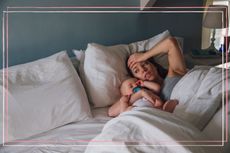 How to deal with lack of sleep as a new parent: 10 tips to help you survive when your newborn needs you through the night
How to deal with lack of sleep as a new parent: 10 tips to help you survive when your newborn needs you through the nightWe've asked the experts for their ideas on battling exhaustion if you're dealing with lack of sleep as a new parent
By Ellie Hutchings Published
-
 How to sleep on a plane: 14 expert tips and kid-friendly ideas for a more peaceful flight
How to sleep on a plane: 14 expert tips and kid-friendly ideas for a more peaceful flightThe experts share their best tips for getting to sleep on a plane, so you can start your next family holiday well-rested.
By Ellie Hutchings Published
-
 What are sleep affirmations and do sleep affirmations work?
What are sleep affirmations and do sleep affirmations work?Do sleep affirmations work? Our experts reveal how this night time practice can benefit your wellbeing.
By Rose Goodman Published
-
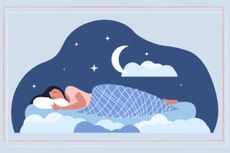 What does it mean when you dream about someone? This sleep expert explains why
What does it mean when you dream about someone? This sleep expert explains whyThese sleep experts have explained what it means when you dream about someone - whether it's a romantic partner, friend or family member.
By Robyn Morris Last updated
-
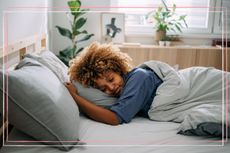 How much deep sleep do you need and 9 ways to get more of it as a new parent
How much deep sleep do you need and 9 ways to get more of it as a new parentWe've asked the experts to explain how much deep sleep you need and how to get more of it if your baby is keeping you up at night.
By Ellie Hutchings Last updated
-
 What does my dream mean? 14 of the most common dream meanings explained
What does my dream mean? 14 of the most common dream meanings explainedHave you ever dreamt that you were flying? Or that your teeth have fallen out? We've asked the experts to explain these dream meanings - and loads more!
By Ellie Hutchings Last updated
-
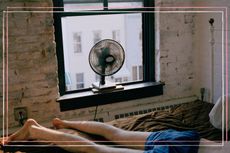 How to sleep in the heat: 25 expert tips for getting to sleep in a heatwave
How to sleep in the heat: 25 expert tips for getting to sleep in a heatwaveThese tips for how to sleep in the heat will help put an end to that unbearable tossing and turning on those sweltering summer nights.
By Emily Stedman Last updated

